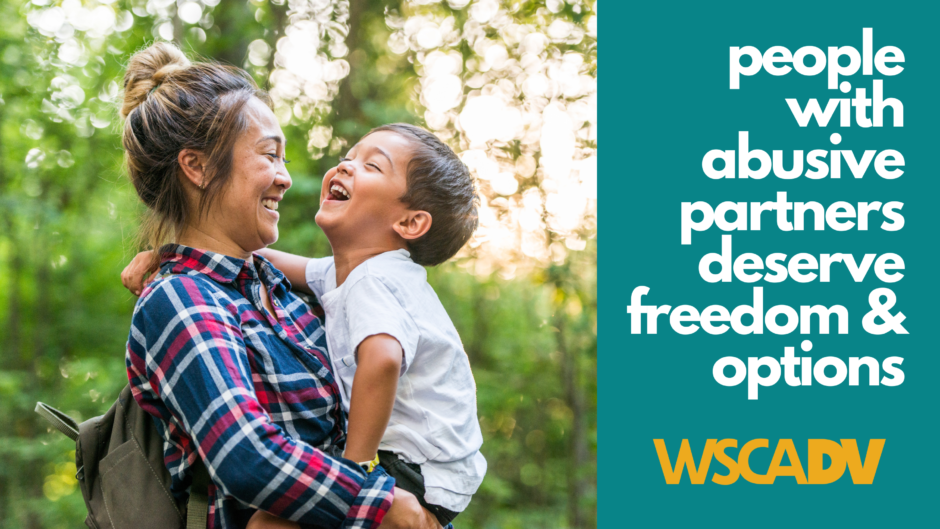
Every survivor deserves the right to make decisions about their bodies and lives, free from violence, coercion, and control from abusive partners or unjust laws. The U.S. Supreme Court draft opinion overturning Roe v. Wade that was leaked earlier this month erodes the privacy and individual freedom survivors need to regain safety and control over their lives. Without access to reproductive healthcare, including birth control and abortion, survivors lose the freedom and options they need to live independent of an abusive partner.
Domestic violence advocates know that reproductive coercion is a major part of domestic abuse. Sabotaging birth control, coercing a person into pregnancy, or forcing a partner to carry a pregnancy to term are all ways that abusers maintain power and control and entrap survivors. In fact, abusive partners often coerce survivors into “rapid repeat pregnancy” as a way to make it virtually impossible to leave the relationship. Safe, confidential, and accessible reproductive healthcare can give survivors the freedom to leave abusers and create new lives for themselves and their children.
Roe v. Wade determined that the 14th amendment of the U.S. Constitution protects personal liberty, including the right to privacy from government action and control over one’s body. Survivors say that the right to privacy is fundamental to safety. In fact, the National Domestic Violence Hotline found that 1 in 4 survivors would not call the police for help, citing the need for privacy and fear of retaliation.
Like intimate relationships, reproductive healthcare is a deeply personal matter. People with abusive partners, no matter where they live or how much money they make, deserve the right to make the personal decisions that are best for themselves and their families without interference from abusive partners, medical providers, or restrictive laws. Survivors’ ability to decide for themselves what they need is central to self-determination, safety, and well-being.
For many communities throughout or nation’s history, reproductive justice* has not been a reality. Black and Indigenous people, and people of color have been subjected to forced reproduction, coerced sterilization, state control over their family lives, and lack of safe, dignified care. Black women experience pregnancy-related death at four times the rate of white women. In 2020, immigrant women fleeing violence were forcibly sterilized in federal ICE detention. Rural, economically struggling communities often can’t count on confidential, nonjudgmental reproductive healthcare – or any nearby healthcare – and much of rural Washington has little to no state-certified childcare. Gender non-conforming and trans people have often been left out of reproductive justice conversations. Organizations like SisterSong, Indigenous Women Rising, and King County-based Surge Reproductive Justice have worked for years to advance reproductive justice. But overturning Roe v. Wade will force people into hiding and possible imprisonment, just for making decisions about what’s right for their bodies and families.
Criminalizing reproductive healthcare like abortion emboldens abusive partners and puts survivors at risk for criminalization. Authorities already often disbelieve and even arrest survivors of sexual and domestic violence when they tell what happened to them or try to protect themselves and their children. As legislators write bills to restrict abortion and increase state surveillance of pregnant people, survivors and those who support them are at risk of prosecution for decisions to protect their survival and well-being, and abusive people gain another powerful tool to threaten and control their partners.
Our statewide unity as a Coalition is powerful, and we have worked for decades to protect and advance reproductive rights and support, including the right to safe, legal contraception, economic support for survivor households, and abortion healthcare in Washington. This ruling will undermine domestic violence programs and immediately endanger survivor safety and privacy. One of the most important ways to prevent domestic violence is through supportive community: neighbor to neighbor, friend to friend. Eliminating reproductive rights, taking away options, and making it more difficult – even criminal – for others to help survivors access safe healthcare, harms all of us.
Survivors are safest when they have the freedom to write their own futures. We stand with advocates throughout Washington and across the nation who are working to ensure that people with abusive partners have the liberty and options they need to heal and thrive.
What You Can Do Now:
- If you are a domestic violence advocate, learn more about reproductive justice, survivors’ options, and abortion care in Washington so you can share with your participants
- Talk with your friends and family about survivors’ right to privacy, safety, and options
- Sign up for WSCADV’s action alerts. As news unfolds, we will keep you informed about what is happening and what you can do
*Reproductive justice means the personal liberty and the right to have or not have children, to raise them in a safe environment, and to access good healthcare. Though communities of color have always fought for reproductive justice, the term was officially named in Chicago in 1994 by Women of African Descent for Reproductive Justice.